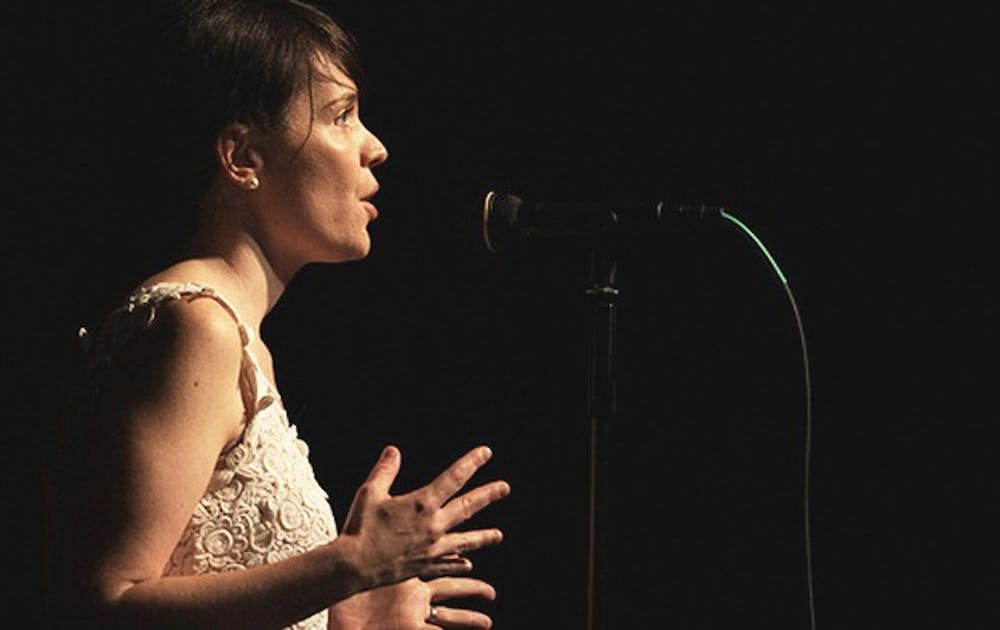Having rehearsed the story of my “first time” for a couple of hours this past weekend, I was confident I’d be one of the more stage-ready contestants at Tuesday night’s StorySLAM at Motorco Music Hall. I was so wrong. That has to be the only open mic night I’ve been to where there hasn’t been a single painfully awkward, long performance. The level of professionalism and effort put forth by predominately amateur storytellers was humbling, to say the least.
The event owes its popularity to The Monti, a fast-growing North Carolina nonprofit that showcases short, unscripted, nonfiction narratives onstage. This week, The Monti put on its monthly five-minute narrative showdown, in which eight randomly chosen storytellers competed for audience approval. This month’s theme was “First Times.” Believe it or not, only a couple of contestants took the prompt in the euphemistic sense.
The tone of the stories was overwhelmingly comedic, but all narratives revealed vulnerabilities on behalf of the storyteller. This month’s winning narrator described the struggle of identity while buying and wearing her first dress ever, the one that she would wear to her high school prom.
Motorco was sold out, but that was no first for The Monti. The quantity of submissions, however, was at an all-time high. Not everyone who submits their name at StorySLAMs gets chosen, but never has the number of submissions more than doubled the number of performers. Jeff Polish, founder of The Monti, hopes to host a Part Two to “First Times” due to its popularity.
“The first time we had a StorySLAM, it was a nightmare. We had a sold out crowd, but only two storytellers,” noted Polish. “Now, four years later, we’ve successfully cultivated a storytelling community. People know to bring their A-game.”
“This week’s StorySLAM was The Monti’s best I’ve seen,” commented Clare Fieseler (’10), a graduate of the Nicholas School of the Environment and last month’s StorySLAM champion. When asked what drew her to get up on stage and tell a story, Fieseler described the unique opportunity to make the personal public.
“I saw the awards show last year and was so inspired. It’s the most raw form of narrative—it’s just you and a microphone,” said Fieseler. “I had written my story out once, and practiced twice. I didn’t know a soul in the audience.”
Between acts, Polish kept the night alive with his own prepared anecdotes. None of his tales spared any dirty details: Polish admitted to sharing an unintentionally lewd set of stories. I won’t spoil the surprises, but I’ll just say that his topics included his first time at a nude beach, the gross details of college fraternity life and the peculiarities of his son’s bris.
StorySLAM depends almost entirely on audience content, but The Monti also puts on their own fully rehearsed shows. Polish gathers local and national celebrities, activists and artists to voice their struggles. Among the many veterans of The Monti is Emmy award-winning screenwriter, novelist and English professor Michael Malone, who teaches two classes at Duke. Malone spoke to the generational appeal of The Monti’s storytelling format.
“The form and the medium that follows the demand of the culture is most successful,” said Malone, who performed alongside Elizabeth Edwards for The Monti at the ArtsCenter in Carrboro. “The success of The Monti is tied to the return of the short story, in a generation raised on shorter segments of media.”
Another storytelling mode had a cameo appearance at the SLAM. CJ Suitt, youth outreach director for the Chapel Hill-based spoken word organization Sacrificial Poets, contributed a guest performance. Suitt communicated the story of his own “first time” through impassioned rhythmic poetry, providing powerful stylistic contrast.
Suitt’s appearance was partly promotional as well; Polish pitched the upcoming performance collaboration between Sacrificial Poets and The Monti later this year. Suitt described how The Monti and “SacPoe” identified plenty of common ground between their organizations’ visions.
“Spoken word and performance poetry is an art highly based in storytelling,” noted Suitt. “Story-sharing can connect us, in a world and a time where we learn about our neighbors from television, neighborhoods that we could drive to, walk to, meet folks in.”
Suitt identified some of the explicit thematic differences between the two storytelling communities. He said that while stories presented at The Monti often touched upon important societal trends, SacPoe tends to approach political and social issues directly.
“Sacrificial Poet’s vision is to break silence,” said Suitt. “Especially around things people are voting on, interacting with in their daily lives. For us, the personal is political.”
Both organization leaders believed that storytelling has universal relevance. Polish said he looks forward to expanding The Monti’s audience base beyond the Triangle, especially through the continued production of story podcasts of live performances.
“I think that The Monti has the ability to go outside of the triangle and leave North Carolina,” noted Polish. “When I say I intend for the podcasts to be the most popular podcasts out there, I know I sound ridiculous. But I believe in it.”
Polish admitted that he never saw himself as the founder of a professional arts company when he was growing up. Polish received his Ph.D. in Biology from Washington University, but left teaching in April 2008 to form The Monti. His group takes its name from a close friend with whom he’d shared stories for hours at a time.
“Stories unite, connect and reduce the distance between strangers to zero,” said Polish. “When you see somebody you’ve never met before, all you notice are the differences. When you hear somebody tell a story, all you notice are the similarities.”
The Monti’s next rehearsed show, with the theme of “Deadlines,” will be performed tonight at The Pour House in Raleigh. The show begins at 7:30 p.m. and tickets are $15.
Get The Chronicle straight to your inbox
Signup for our weekly newsletter. Cancel at any time.

